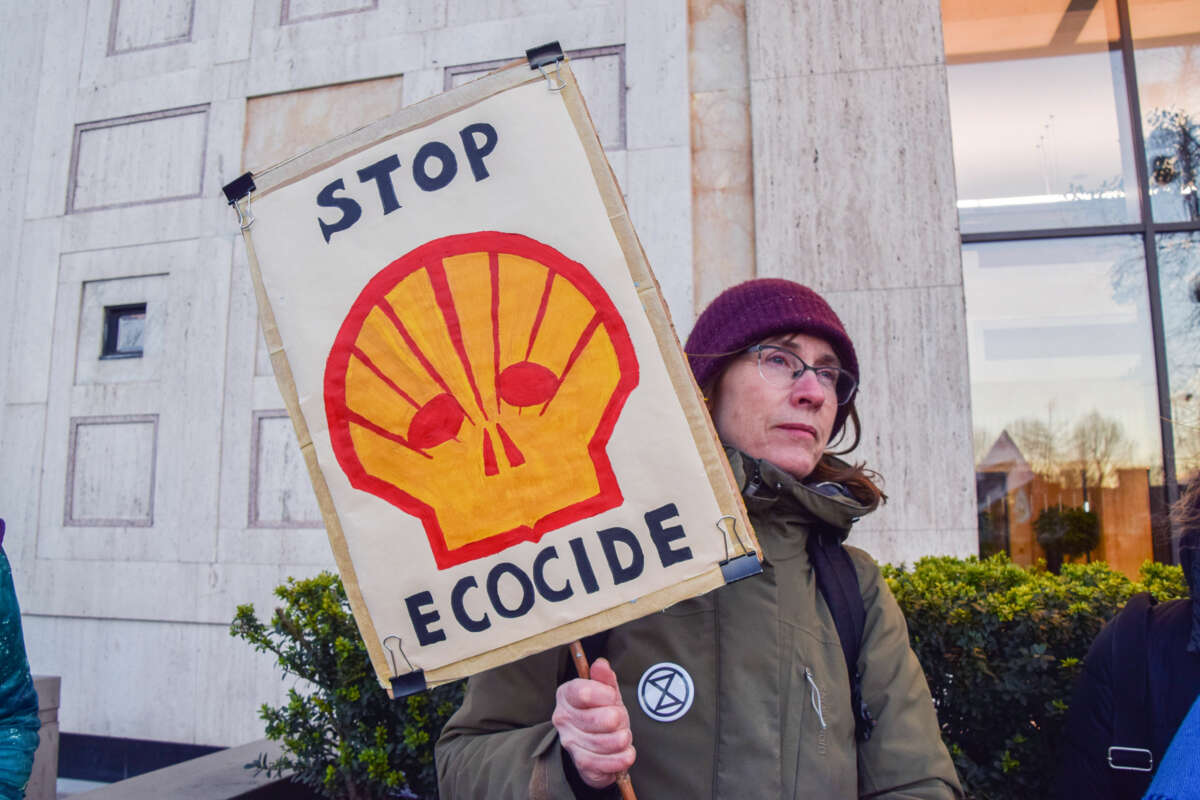Honest, paywall-free news is rare. Please support our boldly independent journalism with a donation of any size.
When Shell Chemical Appalachia announced the start of a massive plastics manufacturing facility last November in western Pennsylvania, the subsidiary of oil major Shell described it as “world-class,” and touted the company’s “strong and innovative safety focus.”
But now, just six months later, the plant has been the site of multiple malfunctions, including the leakage of benzene, a known carcinogen, along with other pollutants last month. The events come with putrid chemical odors and have area residents fearing for their health and calling on state officials to shut the plant down.
“We’re being told everything is okay, everything is safe, and it’s not,” said Hilary Flint, a cancer survivor who said she worries daily about how the malfunctions at the Shell plant may be affecting her health. Though she lives several miles away, she often spends time visiting her partner in Monaca, the community neighboring the Shell plant. Flint said both she and her partner contracted respiratory illnesses the week of the Shell plant’s chemical leak.
On Tuesday, the environmental advocacy group Earthworks shared a video the group said showed “a major pollution event” that occurred April 13-14, dates that Shell air monitors recorded benzene levels up to 110 micrograms per cubic meter. The minimal risk level for benzene exposure is set at 29 micrograms per cubic meter, set by the U.S. Department of Health and Human Services’ Agency for Toxic Substances and Disease Registry. The World Health Organization says benzene exposure is a “major public health concern” and that “no safe level of exposure can be recommended.”
For Shell, a benzene level above nine micrograms per cubic meter is supposed to trigger an investigation, under the terms of an agreement between Shell and environmental groups.
A key issue is Shell’s “ground flare pollution control,” a process designed to burn up invisible harmful hydrocarbons produced through plant operations so they don’t contaminate the air. While Shell has assured the community its flares successfully destroy up to 99.55% of emissions, Earthworks and other groups critical of Shell claim air monitoring proves the flaring operations are not working.
“Shell is releasing harmful pollutants and exceeding multiple pollution limits,” Anais Peterson, Earthworks petrochemical organizer, said in a statement Tuesday. “For almost six months Shell has been polluting Beaver County and the surrounding areas with no repercussions.”
Shell did not respond to a request for comment. In its air monitoring report for early April, however, the company stated that on April 11, the plant was “de-inventorying in preparation for repair work,” when “excess free hydrocarbon was sent to the biotreaters from one of the wastewater tanks due to a level issue.” The company said the “cause is understood and has been addressed and solutions are being implemented.”
Multiple Malfunctions
Shell’s facility, which it calls Shell Polymers Monaca, is situated on 386 acres on the banks of the Ohio River in Beaver County, Pennsylvania, approximately 30 miles northwest of Pittsburgh.
It is the first major plastics production plant in the northeastern U.S. and the biggest petrochemical plant outside of the U.S. Gulf Coast. Designed to turn raw materials derived from oil and gas into a plastics component called polyethylene, the operation is emblematic of an ongoing buildout of petrochemical plants in oil- and gas-rich areas as major petroleum producers such as Shell eye plastics as a key profit stream.
The facility experienced numerous equipment problems last year as it prepared to come online, with problems continuing after the operational startup in November. The company has submitted 39 malfunction reports to state regulators since January 2022, including over a dozen since the facility came online.
State regulators at the Pennsylvania Department of Environmental Protection (DEP) have issued 14 citations, called Notices of Violations, to Shell since April 2022, and 11 of those have been over air permit violations. The plant continuously emits air pollutants such as volatile organic compounds and nitrogen oxides in excess of its permit levels.
There have been multiple large flaring events in recent months including an emergency flaring episode on February 13 that lasted several hours and featured visible plumes of black smoke and a fiery orange flare. A month later the plant had another major flaring event lasting almost three hours.
“It’s clear something is wrong with this plant,” said Matt Mehalik, executive director of Breathe Project, an environmental and public health collaborative advocating for improved air quality. He said it is particularly egregious that the operations received $1.65 billion in tax breaks.
Area residents and community advocates say the response to the chemical leak from state and local officials in some ways echoes that of some government officials in the wake of the East Palestine, Ohio train derailment just 20 miles away. Government officials have downplayed residents’ concerns for their health, they say.
“The government and the companies tell you it’s safe, but that’s not how you feel,” Flint said. “Between Shell and the Norfolk Southern train derailment, I think that the [Pennsylvania] DEP and the EPA need to be held liable for how they are putting these communities at risk.”
DEP spokesperson Lauren Camarda declined to comment.
Media that fights fascism
Truthout is funded almost entirely by readers — that’s why we can speak truth to power and cut against the mainstream narrative. But independent journalists at Truthout face mounting political repression under Trump.
We rely on your support to survive McCarthyist censorship. Please make a tax-deductible one-time or monthly donation.
